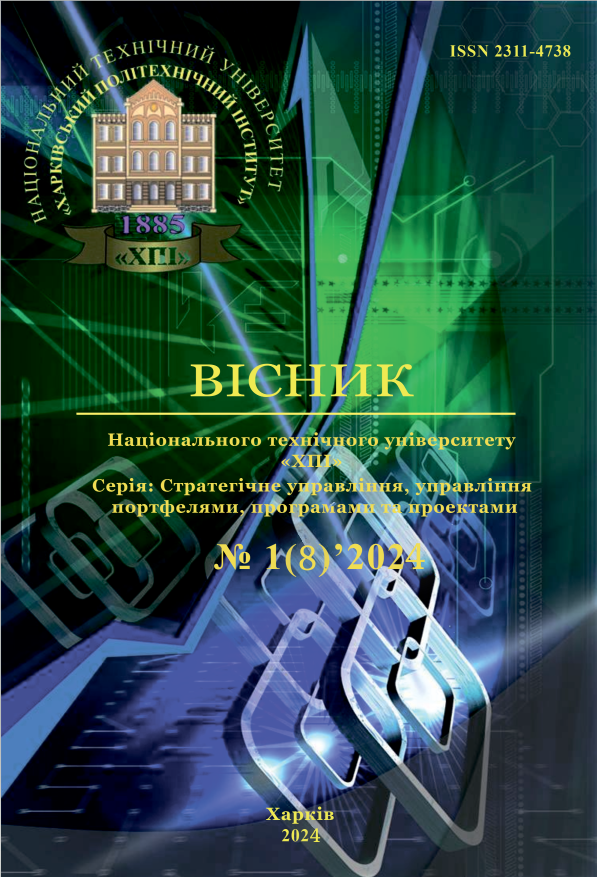PROJECT MANAGEMENT MODELS FOR DEVELOPMENT PROJECTS IN SELF-MANAGED ORGANIZATIONS IN A SYNCRETIC CONTEXT
DOI:
https://doi.org/10.20998/2413-3000.2024.8.2Keywords:
project and program management, self-managed organizations, development projects, syncretic methodology, project management models, infrastructure restoration projects of UkraineAbstract
The relevance of developing models and methods of syncretic management for development projects of self-managed organizations is justified. The practical value of such models for infrastructure restoration projects in Ukraine is emphasized. The methodological approach of syncretic management to the implementation of infrastructure restoration projects was proposed, an analysis of the environment for the implementation of development projects of self-managed organizations was carried out, including the characteristics of the environment of the management models of development projects, suitable models of the life cycle of development projects and the main elements of the self-managed approach for use in the studied projects. Three characteristics of the life cycle model for development projects of self-managed organizations are defined, and a four-phase model is proposed: initialization, implementation, testing, and closure. The main elements of the self-managed approach were identified for use in the studied projects, consisting of seven such elements: the use of the principle of self-management, collegial decision-making, the absence of a formal leader, the assumption of responsibility by members of a self-managed team, self-determination of motivation, the use of holacracy models and methods, independent development of competence by participants teams Two models were proposed - α-model and β-model of management of development projects of self-managed organizations in a syncretic context. Visualization of the specified models, their description and comparative characteristics were provided. In the development of this approach, a complex model of management of development projects of self-managed organizations was also formalized in a syncretic context, in the form of a formal eight using set theory. a SWOT analysis of the proposed models was carried out, their strengths and weaknesses, opportunities and threats that may arise as a result of their use were highlighted. A conclusion was made based on the results of the SWOT analysis. Prospects for further research in the chosen direction were formulated. It was determined that the qualified implementation of the mentioned developments in the practice of infrastructure restoration projects will potentially increase the effectiveness of such projects and portfolios of such projects.
References
Decree of the President of Ukraine dated April 21, 2022 No. 266/2022 "Questions of the National Council for the Recovery of Ukraine from the Consequences of the War". Official web site of President of Ukraine. Access mode: https://www.president.gov.ua/documents /2662022-42225.
The Standard for Project Management and a Guide to the Project Management Body of Knowledge (PMBOK® Guide) – Seventh Edition / USA. – Project Management Institute, 2021. – 250 p.
Project Manager Competency Development Framework – Third Edition. Project Management Institute. 2017. Access mode: https://www.pmi.org/pmbok-guide-standards/framework/pm-competency-development-3rd-edition.
Manifesto for Agile Software Development [Електронний ресурс] / Official site of Agile Manifesto. – URL: https://agilemanifesto.org/
Stellman A., Greene J. (2013) Learning Agile: Understanding Scrum, XP, Lean, and Kanban. O’Reilly Media, 420 p.
Bushuyev, S., & Kozyr, B. (2020). Methodology hybridization of infrastructure projects and programs management. Herald of the Odessa National Maritime University, (61), 187-207. https://doi.org/10.47049/2226-1893-2020-1-5-26.
Tanaka H., Bushuyev S. Innovative development and meta program management of a new generation of megaprojects in the oil & gas and infrastructure sectors Management of Development of Complex Systems. 16, 2014, pp. 60-68.
Bushuyev S.D., Bushuyeva N.S., Bushuyev D.A., Bushuyeva V.B. Strategy for sustainable development of rapid growing organizations. Bulletin of the National Technical University "KhPI". Ser.: Strategic management, portfolio, program and project management: coll. of sci. papers, Kharkiv, NTU "KhPI", 2022, 1 (5), pp. 23-28.
Kononenko I., Kpodjedo M., Morhun A., Oliinyk M. Information technology for choosing the project portfolio management approach and the optimal level of maturity of an organization. Radioelectronic and Computer Systems, 4, 2022, pp. 173-190.
Frederic Laloux. Reinventing Organisations: A Guide to Creating Organisations Inspired by the Next Stage of Human Consciousness. Nelson Parker. February 9, 2014, 382 p.
How are holacracy-powered organizations different? Website of Holacracy Foundation, 2020. URL: https://www.holacracy.org/explore/why-practice-holacracy
Mamoli S. Holacracy for humans. The InfoQ eMag. Issue 71. May 2019, pp.10-17.
Ivko A.V. pproaches of syncretic management in road infrastructure restoration projects. Visnyk National Transport University. Series «Technical sciences». Scientific journal. Kyiv, National Transport University, Issue 3 (53), 2022, pp.433-442.
Andii Ivko. Models of the project management system for the development of self-managed organizations in the portfolios of infrastructure renewal projects of Ukraine. Dorogi і mosti [Roads and bridges]. Kyiv, 2023. Iss. 28, pp. 28–37.
Downloads
Published
Issue
Section
License

This work is licensed under a Creative Commons Attribution-NonCommercial-ShareAlike 4.0 International License.
Our journal abides by the Creative Commons copyright rights and permissions for open access journals.
Authors who publish with this journal agree to the following terms:
Authors hold the copyright without restrictions and grant the journal right of first publication with the work simultaneously licensed under a Creative Commons Attribution-NonCommercial-ShareAlike 4.0 International License (CC BY-NC-SA 4.0) that allows others to share the work with an acknowledgement of the work's authorship and initial publication in this journal.
Authors are able to enter into separate, additional contractual arrangements for the non-commercial and non-exclusive distribution of the journal's published version of the work (e.g., post it to an institutional repository or publish it in a book), with an acknowledgement of its initial publication in this journal.
Authors are permitted and encouraged to post their published work online (e.g., in institutional repositories or on their website) as it can lead to productive exchanges, as well as earlier and greater citation of published work.

